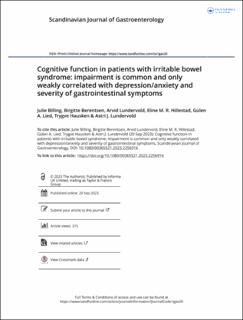Cognitive function in patients with irritable bowel syndrome: impairment is common and only weakly correlated with depression/anxiety and severity of gastrointestinal symptoms
Billing, Julie Eirin; Jacobsen, Birgitte Berentsen; Lundervold, Arvid; Randulff Hillestad, Eline Margrethe; Lied, Gülen Arslan; Hausken, Trygve; Lundervold, Astri J.
Journal article, Peer reviewed
Published version

Åpne
Permanent lenke
https://hdl.handle.net/11250/3117224Utgivelsesdato
2024Metadata
Vis full innførselSamlinger
Originalversjon
Scandinavian Journal of Gastroenterology. 2024, 59 (1), 25-33. 10.1080/00365521.2023.2256916Sammendrag
Objective
To investigate cognitive function in patients with irritable bowel syndrome (IBS) and its relation to anxiety/depression and severity of gastrointestinal (GI) symptoms.
Methods
Patients with IBS (n = 65) and healthy controls (HCs, n = 37) performed the ten subtests of the Repeatable Battery for the Assessment of Neuropsychological Status (RBANS). Age-normed index scores of five cognitive domains (Immediate memory, Visuospatial function, Language function, Attention, Recall) and a total (Fullscale) score were derived from the performance. Emotional function was assessed using the Hospital Anxiety and Depression Scale (HADS), and the IBS Symptom Scoring System (IBS-SSS) was used to define the severity of GI symptoms.
Results
Patients with IBS reported significantly higher scores than the HC group on symptom measures of anxiety and depression, and significantly lower scores on the Immediate memory, Recall, and Fullscale RBANS indexes. Approximately 30% of the IBS patients obtained index scores at least one standard deviation below the population mean, and more than 50% scored above the screening threshold for an anxiety disorder. The severity of GI symptoms was significantly correlated with the severity level of anxiety symptoms (p=.006), but neither the severity level of emotional nor GI symptoms was significantly correlated with the RBANS index scores in the IBS group.
Conclusion
Cognitive and emotional function were more severely affected in patients with IBS than in HCs. The weak correlation between the two functional areas suggests that both should be assessed as part of a clinical examination of patients with IBS.
